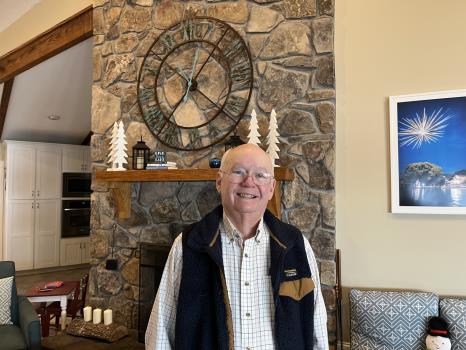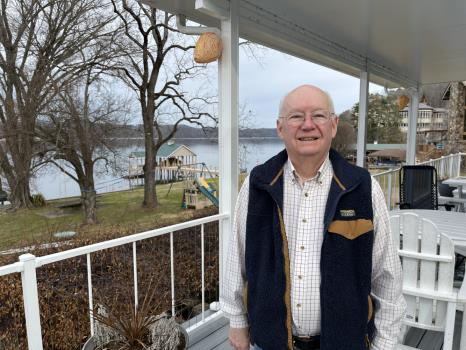
Pete Cooper at his home
photo by John Shearer
In his former job heading the Community Foundation of Greater Chattanooga and in other areas, Pete Cooper has admittedly crossed paths with many types of people.
He has worked with prominent donors, those who have benefited from foundational support, and people he met while growing up in a comfortable middle-class family in North Chattanooga and attending public schools.
But collectively, he feels all Chattanoogans are similar in their mostly positive outlook toward helping and wanting to help others.
“We’ve got so many cheerful givers in this city,” he said on Monday in an interview. “I believe Chattanooga is unique in its culture of charitable giving.”
With his work with the Community Foundation and volunteer service, the Kiwanis Club of Chattanooga thinks he has also given of himself plenty. That was justified by the recent announcement that he is the recipient of the club’s Distinguished Service Award for 2022.
Considered the most prestigious award in Chattanooga for lifetime public service and an annual recognition dating back a century, it will be officially presented to Mr. Cooper at an 11:30 a.m. luncheon on Jan. 24 at the Chattanoogan Hotel.
As Mr. Cooper recently sat down and reminisced from his lakeside home off Highway 58, a residence originally built by his DuPont engineer father and later expanded, he hinted that he was the one who felt blessed working in a job that aided others.
Growing up just north of downtown, he attended Normal Park Elementary, Northside Junior High and Chattanooga High before graduating in 1966. Chattanooga “City” High was a top public high school at that time, with his class producing future doctors, lawyers, and other career professionals, including future University of Georgia President Dr. Michael Adams. But he assumed at the time it was just a normal school.
After graduation, Mr. Cooper had a chance to go to schools like the private Vanderbilt but realized the tuition was cheaper at Ohio State, where his father had gone, so he went there. It was at a time when Ohio State had a top football program under the legendary coach Woody Hayes.
While coach Hayes’ fiery temper later led to his getting fired after punching a Clemson player at the end of a 1978 bowl game, Mr. Cooper said he did have many positive qualities that the students admired, including always going to a hospital when a player was injured or ill.
Coach Hayes was also known for wearing short sleeve white shirts, even in cold games, and Mr. Cooper jokingly realized he also had several layers of clothing to keep warm after they became noticeable one rainy game.
After Ohio State, Mr. Cooper had some good job offers for a young graduate in 1970 but decided to return to Chattanooga and work for American National Bank. There he would meet someone who also had the motivational and charismatic skills of a successful coach, but in a much more upbeat and positive manner.
The man was bank executive Scotty Probasco, with whom he would enjoy a close relationship until Mr. Probasco died in 2015. Mr. Cooper said Mr. Probasco had a generous heart in helping various causes and people in Chattanooga.
At American Bank, Mr. Cooper started in the trust department, went through the junior executive training program, and then joined the bank’s charitable trust department, which gave donations to various groups and institutions.
“I had been in that department for several months when the head went to another bank, so I became head of the charitable trust department by default,” he said with a laugh. “There were only three in the department.”
He would head the department from 1972 until 1990, greatly enjoying the experience, he said.
“Not only did I learn a lot about investments, but I met a lot of people in town,” he said. “I had a wonderful career there.”
He left when he learned the board of the Community Foundation wanted to hire its first director – more than 25 years after it had begun as a communitywide charity group.
“It had a board but not much else,” Mr. Cooper recalled of his early days working there. “We didn’t have much money or an office or even a file cabinet. It wasn’t fully developed.”
He said he was employee No. 1 and was later joined by the late Linda Standefer Chapin, and the foundation slowly took off in visibility and being able to help projects and organizations.
“I had to explain to people what the Community Foundation was,” he said. “It was not like Benwood and Lyndhurst” (two foundations that started with money from the Thomas and Lupton Coca-Cola bottling profits, respectively).
“The Community Foundation is different. It has multiple funds doing all kinds of good in all kinds of areas for the community. It makes charitable giving easier.”
He said the foundation during his time did everything from donate money for the riverfront redevelopment plan under former Mayor Bob Corker to helping a non-profit get started by providing a tax-free umbrella.
“It was a menagerie of funds,” he said, adding that the foundation also became consultants to non-profits.
Mr. Cooper said he stayed so busy doing everything from meeting with a potential major donor to the foundation or helping a non-profit or even doing some early computer programming that he worked long days.
“We didn’t do 40-hour weeks,” he said with a smile.
But the work was still quite rewarding and exhilarating and was at a time when Chattanooga was really starting to blossom as a mid-sized city with a scenic setting and a nice downtown where people wanted to visit, reside, or work.
“In those 25 years, Chattanooga really came to life,” Mr. Cooper said, adding that the foundation also located its office in the historic St. John’s Restaurant building on Market Street while he was there. “So many things were happening, and the Community Foundation was involved in much of it. The Chattanooga community responded so nicely. Donors stepped up.”
While people might historically think of donor money in Chattanooga as coming from old families who enjoyed success in businesses like Coca-Cola bottling or insurance before World War II, Mr. Cooper said plenty of others are coming along who have done well recently in other areas. That includes those in the tech sector, hotel operations, and real estate development, he added.
As a result, Chattanooga will continue to be a much more giving town than its size might indicate, he believes.
“Chattanooga is at the golden age of philanthropy now,” he said. “They are making a lot of new money that will be the old money in town.”
In 2015, after a quarter century enjoying being kind of a middleman for all the worthy Chattanooga charitable and non-profit projects, Mr. Cooper retired.
He was succeeded by Maeghan Jones, who now runs the foundation from a building in the 1400 block of Williams Street.
In retirement, he enjoys traveling some with his wife, Linda, and spending time with five grandsons, which includes an extended family dinner every Sunday at their pair of tables in their lakeside den set up like in a restaurant meeting room.
But he also still keeps busy with service. “I still consult with non-profits for free, I’m chairman of the board of the Chattanooga Tumor Clinic, and I am consulting with a group of ministers called Kingdom Partners about affordable housing and literacy,” he said, adding that he seldom has a day where he is not talking to someone or doing some other work related to his volunteerism.
But he has admittedly taken a little time to sit back and soak in having been told the surprise news that he is receiving the Kiwanis award and will join the list of honorees that includes others with whom he worked and admired over the years.
“The award is indicative that this city values people who are major contributors to the city,” he said with appreciation. “We celebrate it, so to me it is humbling to be in the ranks of the most notable people in this city’s history.”
* * *
Past winners of the Kiwanis Club of Chattanooga’s Distinguished Service Award Have Been:
1922 -- C. E. James and Jonathan W. Bachman; 1923 -- Z. W. Wheland; 1925 -- George H. Patten; 1927 -- Adolph S. Ochs; 1928 -- Robert Hooke; 1929 -- George Fort Milton; 1930 -- William E. Brock; 1931 -- John Staigmaier; 1932 -- T. C. Thompson; 1933 -- Thomas S. McCallie; 1936 -- Alex Guerry; 1937 -- John E. Lovell; 1938 -- Clara Carpenter and Annetta Trimble; 1940 -- Robert E. Biggers; 1941 -- Walter C. Johnson; 1942 -- Anne F. McClure; 1943 -- Spencer J. McCallie; 1944 -- E. Y. Chapin, Sr.; 1945 -- John B. Steele; 1946 -- James L. Fowler; 1947 -- Milton B. Ochs; 1948 -- J. Park McCallie; 1949 -- Morrow Chamberlain; 1950 -- Harry Miller.
1951 -- Dillard H. Griswold; 1952 -- Roy McDonald; 1953 -- David Lockmiller; 1954 -- Robert Sparks Walker; 1955 -- John S. Fletcher; 1956 -- Harry C. Carbaugh; 1957 -- Clay Evans Johnson; 1958 -- States R. G. Finley; 1959 -- A. Mose Siskin and Garrison Siskin; 1960 -- Louis J. Williams; 1962 -- DeSales Harrison; 1963 -- Raymond B. Witt, Jr.; 1964 -- Louise G. Currey; 1965 -- William E. Brock, Jr.; 1966 -- Joseph Johnson, Jr.; 1967 -- Floyd C. Delaney; 1968 -- Cartter Patten; 1969 -- William O. Hubbuch; 1970 -- Robert L. Maclellan; 1971 -- A. J. Koblentz; 1972 -- Gordon P. Street and Ruth L. Street; 1973 -- Joseph Davenport, Jr.; 1975 -- Virginia W. Power; 1976 -- Frank W. Wilson; 1977 -- Stanyarne Burrows, Jr.; 1978 -- David P. McCallie and Maddin L. McCallie; 1979 -- Mai Belle C. Hurley; 1980 – Mildred Montague.
1981 -- Scott L. Probasco, Jr.; 1982 -- William G. Raoul; 1983 -- W. Henry Trotter; 1984 -- Spencer McCallie, Jr.; 1985 -- Hugh O. Maclellan, Sr.; 1986 -- Florence B. Witt; 1987 -- Joseph F. Decosimo; 1988 -- James D. Kennedy, Sr.; 1989 -- Ruth S. Holmberg; 1990 -- Carey Hanlin; 1991 -- John T. Lupton; 1992 -- Robert Kirk Walker; 1993 -- John Carroll Stophel; 1994 -- Mary Holliday and Pope Holliday; 1995 -- Lee S. Anderson; 1996 -- Jack H. McEwen; 1997 -- John P. Guerry; 1998 -- Frank McDonald; 1999 -- Claude C. Bond; 2000 -- Gordon L. Smith, Jr.; 2001 -- Ray L. Nation; 2002 -- Vernon W. Cox; 2003 -- Olan Mills and Norma Mills; 2004 -- Dr. Clifford Hendrix, Jr.; 2005 -- Jac Chambliss; 2006 -- Jerry V. Adams; 2007 -- Ralph W. Mohney, Sr. and Nell Mohney; 2008 -- Grady P. Williams; 2009 -- H. Grant Law, Jr.; 2010 -- Richardia (Rickie) Pierce; 2011 -- Tom Edd Wilson; 2012 -- Charles (Chuck) Zeiser; 2013 -- T. Maxfield (Max) Bahner; 2014 -- Dr. Fred Obear and Ruth Obear; 2015 -- John P. Franklin, Sr.; 2016 -- Alexander (Zan) Guerry, III; 2017 -- Harry (Hap) Harwell, Jr.; 2018 -- James (Jim) and Elaine Hill; 2019 -- Dr. Clifton (Clif) Cleaveland; 2020 – no award due to the pandemic; and 2021 – Dr. Edna Varner
* * *
Jcshearer2@comcast.net

Pete Cooper at his home
photo by John Shearer